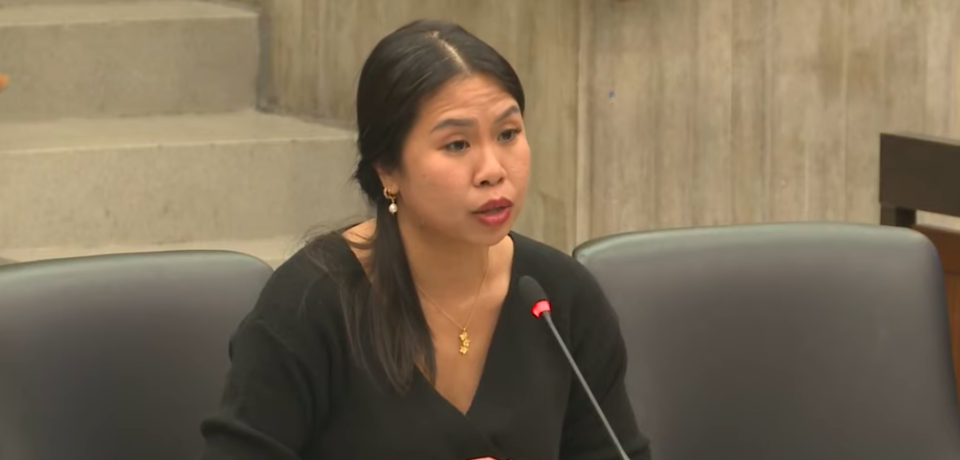In a video shared with GBH News, a recently arrived migrant rests his head on a small mattress squeezed beneath a plastic kitchen table, just next to a refrigerator. He is paying rent to sleep in a tiny space in someone else’s apartment.
It is just one example of the dire circumstances for migrants in Massachusetts, according to nonprofit advocates testifying Monday before the Boston City Council Committee on Civil Rights and Immigrant Advancement.
Newly arrived immigrants are sleeping in church basements, struggling with school enrollment and spending their days wondering where they can live, they said.
“Boston has seen a substantial rise in the number of migrant families seeking shelter and asylum over the past not only just months but the past years,” said At-Large Councilor Ruthzee Louijeune, who convened the hearing.
The issue was pushed into the spotlight when Florida Gov. Ron DeSantis chartered private flights to transport migrants from the border to Martha’s Vineyard in September. Beyond that, more migrants have come of their own volition seeking help in the region’s hospitals and nonprofits.
The city has been convening meetings every other day to address the unfolding situation. Louijeune held Monday’s hearing to get testimony from advocates on the ground in the hopes of better allocating city resources while some lawmakers push to dedicate more funds at the state level. Advocates overwhelmingly said migrants’ need is growing, and that more than anything, housing is what’s needed.
La Colaborativa in Chelsea has been helping between 80 to 120 families a month as a one-stop shop for assistance with health care and school enrollment — and exploring options for shelter.
“I have not yet been able to place the family in a shelter, which brings back to the point that was made earlier. ... Housing is a huge gap,” said Norieliz DeJesus, policy director and triage manager at La Colaborativa. She described the man renting the spot under the table and said the organization has been “flooded” with new arrivals.
“I think it's a question of resource allocation and it's a question of shelter and coordination between the city and the state,” Louijeune said in an interview with GBH News before the hearing. “It's really like a hodgepodge system.” Beyond housing, she said work authorization and legal assistance with U.S. Immigration and Customs Enforcement is a priority.
Centro Presente is helping at least 10 women and their children a week, according to executive director Patricia Montes. She urged everyone to remember that Central Americans are not economic migrants. “They come because violence is forcing them to come,” she said.
Montes recounted recent stories she’s heard from migrants, including a woman who said she and her kids saw someone get shot with 25 bullets. Another woman, Carolina, whose name was changed in the recounting for her privacy, told Montes she was raped by a gang member while paying an extortion fee, and was told if she didn’t keep paying it, her nine-year-old daughter would also be raped.
The Immigrant Family Services Institute in Mattapan has helped over 200 families with housing by renting apartments, said executive director Dr. Geralde Gabeau at the hearing. She urged the city to consider a one-stop-shop center to welcome new immigrants.
“One of the biggest challenges that we know that we have with immigrants when they come is that we have to send them to this office for myself, that office for my kids,” Gabeau said. “By the time you are sending them to all the other offices, they get lost and they don't want to go.”
The lack of housing is reverberating in other parts of migrants’ lives.
“We also hear of delays in getting new immigrant children enrolled into school. These delays are reported to relate both to vaccine and health access and at times to unstable housing,” said Elizabeth Sweet, executive director of MIRA Coalition.
The city is responsible for sheltering individual adults while the state controls the shelter system for families. In the past months, the largest number of arrivals have been families, according to Boston Office of Housing Stability Deputy Director Danielle Johnson.
She said Boston’s individual adult shelters have taken in 48 migrants since September. They are working with local nonprofits to temporarily house migrants who are awaiting shelter beds.
The state Legislature has already allotted $20 million to support immigrants and refugees. Gov. Charlie Baker also requested an additional $139 million budget to address increased demand on emergency shelter systems, provide supportive services to migrants and establish an intake center in Devens, Mass.
The city is anticipating more migrant arrivals after Title 42 expires on Dec. 21, a Trump-era federal policy that allowed authorities to expel migrants at borders on public health grounds during the pandemic.
Boston has created an operating procedure in case another Martha’s Vineyard situation unfolds in the area, said Monique Tú Nguyen, director of the Mayor’s Office for Immigrant Advancement.
"Mayor Wu and our administration support the right of people to seek asylum and safety, and the city and our communities are welcoming them to the best of our abilities," said Nguyen.
Officials are hoping nonprofits can be supported with their work in the migrant community. Johnson said her office is dispensing $330,000 in COVID recovery funds to Immigrant Family Services Institute in the coming weeks to help with housing and assisting migrants.








